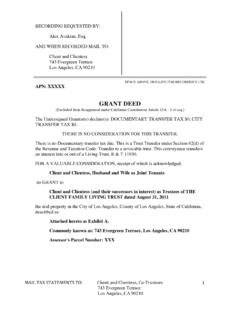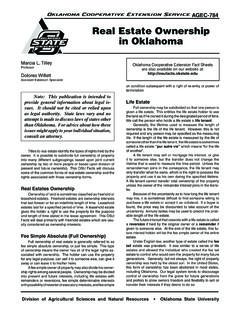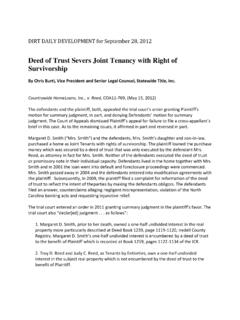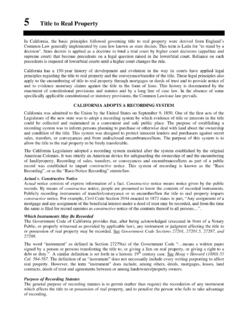Transcription of Joint tenancy with right of survivorship
1 Joint tenancy with right of survivorshipUnderstand the potential consequences when titling your assets1 of 4 How you own assets will often aff ect their day-to-day management as well as your ability to transfer them to the next generation. Joint tenancy with right of survivorship (JTWROS) is commonly used because it generally results in the automatic transfer of assets to the surviving Joint tenant(s), avoiding the probate process. It s also perceived as a convenient way to give a childor friend the power to access or manage an account.
2 ** In Louisiana, JTWROS is not a recognized formof property assets as JTWROS, however, may have a number of drawbacks, and at times it could end up being a frustrating roadblock to carrying out your wishes. The following points outline some common issues involved in titling assets as JTWROS and someof the possible consequences. (Note: Unless otherwise indicated, you or your refers to the person furnishing the property, and other Joint tenant or survivingjoint tenant refers to the other, noncontributing Joint tenant.)
3 Joint property passes to the surviving Joint tenant regardless of yourwill or revocable if your will or trust includes contrary instructions, assets titled as JTWROS will transfer to the surviving Joint tenant. As a result, by titling assets as JTWROS,you may unintentionally disinherit parties you meant to benefi t, and trusts orcharitable gifts may not be funded as you tenancy could prevent estate-tax-planning strategies from with estates larger than $ million are likely to be subject to federalestate taxes.
4 (Some states also impose estate taxes, which may begin at lower levels.) Married couples can plan to take maximum advantage of both spouses estate tax exemptions by including provisions in their wills or revocable living trusts to createa credit shelter trust upon their deaths. This is sometimes referred to as a bypass, family or A-B trust plan. However, if the couple titles assets as JTWROS, the credit shelter trust will not be funded; instead, the jointly held property will automaticallypass to the surviving Joint tenant.
5 As a result, the size of the surviving spouse s taxable estate will potentially be increased, making it more likely that heirs will have to pay unnecessary estate owned jointly with a nonspouse may be subject to estate tax on 100%of its value at your the surviving Joint tenant is not your spouse, tax law presumes that the entire value of Joint property must be included in your taxable estate. Even though this property is not a part of your probate estate, it is still a part of your taxable estate for estate tax purposes.
6 Informal plans to have the survivor divide property are not disputes often arise when one child is named as Joint tenant on accountsand other children believe that the parent intended them to be benefi ciaries as well. The surviving Joint tenant cannot be compelled to share the account with others. This report is designed to provide introductory information regarding the subject matter covered. Neither Wells Fargo Advisors nor its Financial Advisors off er legal or tax advice. Consult your attorney or tax advisor for complete, up-to-date information concerning federal and state tax of 4 Special consideration forcommunity property statesAnd because these transfers are treated as gifts, problems can also arise when the surviving Joint tenant wants to share the account with others.
7 As a result, he or shemay be unwilling to make gifts in excess of the $13,000 annual exclusion held accounts give the other Joint tenant unrestricted access toyour general, this means that regardless of who purchased or contributed the funds,each Joint tenant has the ability to make investment decisions and to deposit, withdraw and receive payments from that account, all without notice to or consent of others interested in the account. A Joint tenant is treated as an owner, not a fi duciary, so there is generally no remedy if a noncontributing Joint owner misuses his or her powerover the institutions try to prevent this problem by requiring both parties consent to certain transactions.
8 This is a double-edged sword, however. Should the other Joint tenant refuse consent, you may be unable to complete certain a nonspouse as a JTWROS tenant on certifi cated securities*or real estate may have gift-tax naming someone other than your spouse to the title of property resultsin making a gift. For example, if you add your child as a Joint owner on real property(a home) or certifi cated securities, this act may depending on the value be considered a taxable gift. If so, you could be required to fi le a gift-tax return and useall or a portion of your $1 million lifetime gift exemption, or even pay gift held as JTWROS may require both tenants to authorize thesale of you wish to sell an asset such as real estate or certifi cated securities held as JTWROS, you may be required to get the other Joint owner s authorization to do so.
9 This can be particularly diffi cult if one Joint owner becomes incapacitated and theother Joint owner needs to sell assets to meet living or health-care held as JTWROS between spouses will receive only one-halfstep-up in basis when the fi rst spouse general, property you own receives a step-up in cost basis at your death. In other words, if you own property in single name, upon your death the individual who inherits the property gets a new cost basis determined by the property s fair market value on the day you die (or in some cases a date six months later).
10 This step-up can be valuablein reducing capital-gains taxes when the benefi ciary sells the property. * In other words, securities for which you hold the certifi cates. This issue does not apply to securities heldin street name (where a brokerage fi rm, such as Wells Fargo Advisors, holds the certifi cate for you). This rule generally applies to property held as JTWROS with a nonspouse when you contributed all the property and are the fi rst to die. In 2010 the estate tax is scheduled to be repealed, and the step up basis rules will be replaced by carryover basis rules that will limit the available step-up.









